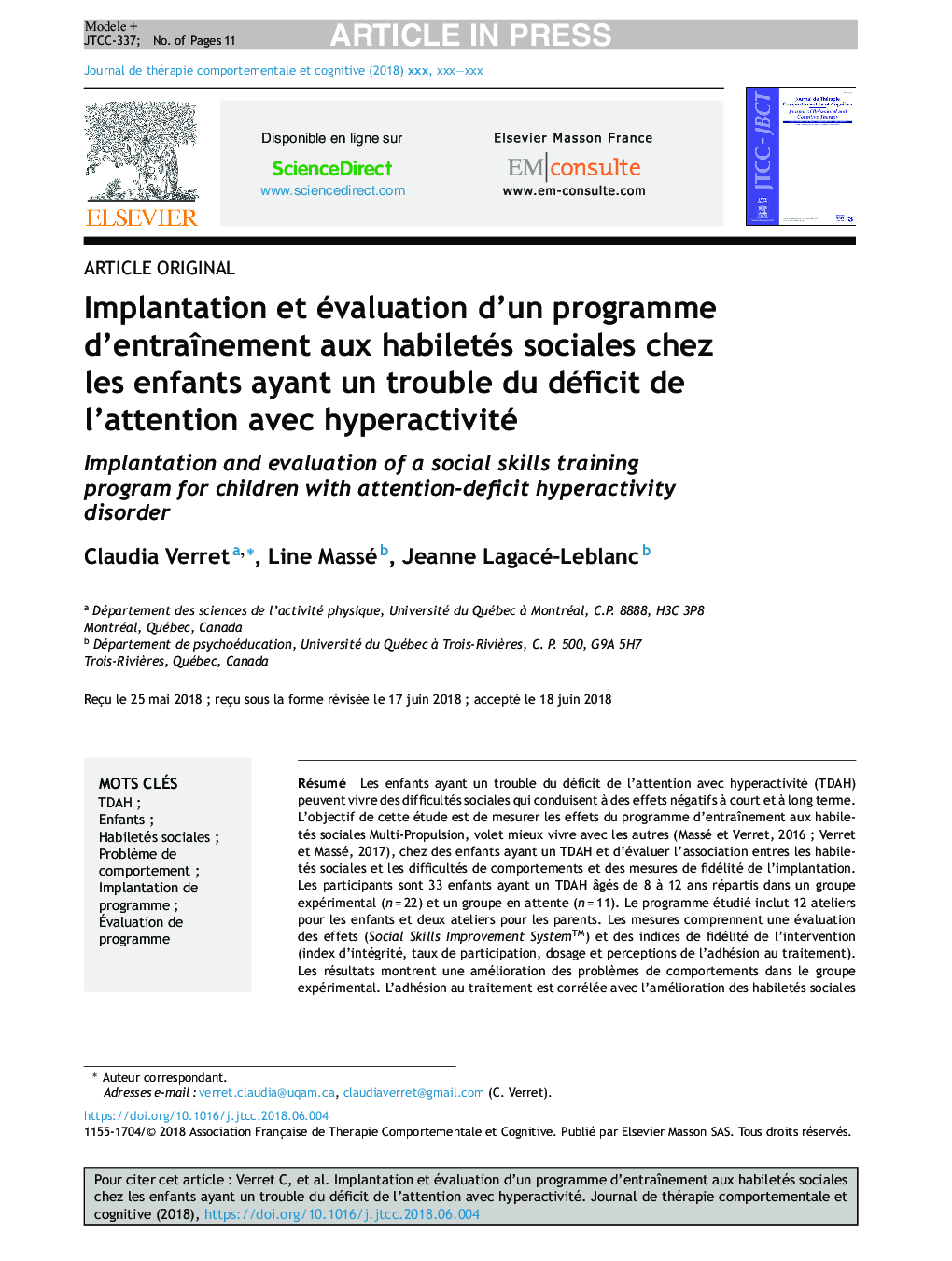| کد مقاله | کد نشریه | سال انتشار | مقاله انگلیسی | نسخه تمام متن |
|---|---|---|---|---|
| 8947930 | 1645621 | 2018 | 11 صفحه PDF | دانلود رایگان |
عنوان انگلیسی مقاله ISI
Implantation et évaluation d'un programme d'entraînement aux habiletés sociales chez les enfants ayant un trouble du déficit de l'attention avec hyperactivité
دانلود مقاله + سفارش ترجمه
دانلود مقاله ISI انگلیسی
رایگان برای ایرانیان
کلمات کلیدی
موضوعات مرتبط
علوم پزشکی و سلامت
پزشکی و دندانپزشکی
روانپزشکی و بهداشت روانی
پیش نمایش صفحه اول مقاله

چکیده انگلیسی
Children with Attention Deficit Hyperactivity Disorder (ADHD) can experience significant social difficulties that have negative effects in their short- and long-term adjustment (McQuade & Hoza, 2015). The effectiveness of social skills training programs is yet to be demonstrated for ADHD children for whom the generalization and transfer of skills seem limited (Mikami, 2015). The goal of this evaluative research is to measure the effects of a training program entitled Multi-Propulsions (Massé et Verret, 2016; Verret et Massé, 2017) on the social skills and behavioral problems of children with ADHD. The second objective is to evaluate the association between measures of implementation fidelity and dependent variables. Thirty-three children having ADHD (12 girls and 21 boys) aged 8 to 12 years old (Mean 10.8 ± 0.7 years old) participated in a social skills training program in three different settings (community, school and clinical). The experimental group included 22 children (8 girls and 14 boys) while the waiting list group included 11 children (4 girls and 7 boys). The families were choosing the skills to work. The weekly program included 12 workshops for children and two workshops for parents. The effects on social skills and behavioral problems were assessed using the Social Skills Improvement Systemâ¢. Fidelity of the intervention was measured using the index of integrity, participation rate, and dosage and perception of adherence to the intervention of children, parents and stakeholders. Social impact was calculated with the occurrence of children classified within the clinical threshold according to SSISTM standards, and was compared before and after the intervention. In addition, percentage of change was calculated for social skills and behavioral difficulties and compared according to each of the environments. The results of the ANCOVA show an improvement in the behavioral problems of the experimental group at the end of the intervention (F(1.22) = 4.789, P = 0.04). Children of this group showed fewer externalized behaviors (F(1.22) = 8.004, P = 0.01), less bullying behaviors (F(1.22) = 6.113, P = 0.021), and less autism spectrum disorder behaviors (F(1.22) = 7.314, P = 0.013) than children in the waiting group. Overall, the quality of the fidelity of the implementation can be qualified as good to excellent (high participation, integrity). The correlation results between stakeholder and parent adherence indicate that a positive association with social skills and a negative association with behavioral problems. The results of the social impact show significant improvements, except for the social skills of school children. The social difficulties or behaviors leading to enrolment in the program as well as the evaluation tool used could explain the lack of significant improvement in social skills. In addition, the conditions of effectiveness of the program, including social validation of skills, selected, adjustment of the learning process in respect of the active nature of children with ADHD, duration of the program, inclusion of parents in the multimodal format, high frequency of feedback allowed in the activities and respect for fidelity of the implementation could explain the significant results. However, there are limits with respect to school stakeholders and the evaluation of instruments used. According to this study, it seems possible to promote the social adaptation of children with ADHD, particular by reducing behavioral problems. This study highlights the importance of providing social skills training programs for children with ADHD who meet the effectiveness conditions recognized in the literature. In addition, it supports the need to document the fidelity of interventions in order to understand the effects of implemented programs. Finally, this study raises potential limitations related to the method of measuring social skills among participants.
ناشر
Database: Elsevier - ScienceDirect (ساینس دایرکت)
Journal: Journal de Thérapie Comportementale et Cognitive - Volume 28, Issue 3, September 2018, Pages 103-113
Journal: Journal de Thérapie Comportementale et Cognitive - Volume 28, Issue 3, September 2018, Pages 103-113
نویسندگان
Claudia Verret, Line Massé, Jeanne Lagacé-Leblanc,